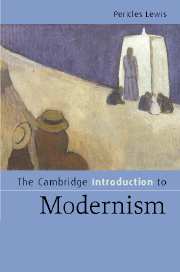Chapter 4 - Poetry
Published online by Cambridge University Press: 05 February 2015
Summary
“Eliot's Waste Land is I think the justification of the ‘movement,’ of our modern experiment, since 1900,” wrote Ezra Pound shortly after the poem was published in 1922. Eliot's poem describes a mood of deep disillusionment stemming both from the collective experience of the First World War and from Eliot's personal travails. Born in St. Louis, Missouri, Thomas Stearns Eliot had studied at Harvard, the Sorbonne, and Oxford before moving to London, where he completed his doctoral dissertation on the philosopher F. H. Bradley. Because of the war he was unable to return to the United States to receive his degree. He taught in a grammar school briefly and then took a job at Lloyds Bank, where he worked for eight years. Unhappily married, he suffered writer's block and then a breakdown soon after the war and wrote most of The Waste Land while recovering in a sanatorium in Lausanne, Switzerland, at the age of thirty-three. Eliot later described the poem as “the relief of a personal and wholly insignificant grouse against life … just a piece of rhythmical grumbling.” Yet the poem seemed to his contemporaries to transcend Eliot's personal situation and represent a general crisis in Western culture. One of its major themes is the barrenness of a postwar world in which human sexuality has been perverted from its normal course and the natural world, too, has become infertile.
- Type
- Chapter
- Information
- The Cambridge Introduction to Modernism , pp. 129 - 152Publisher: Cambridge University PressPrint publication year: 2007

